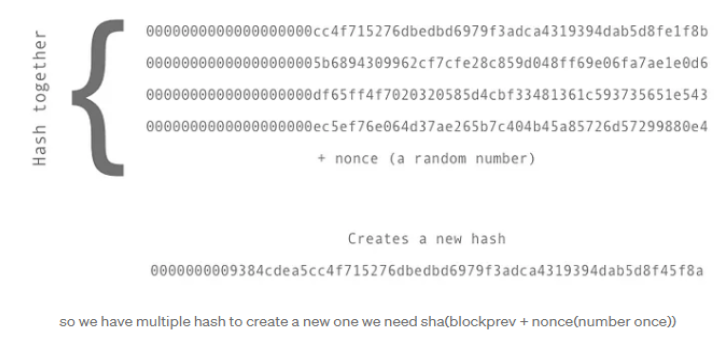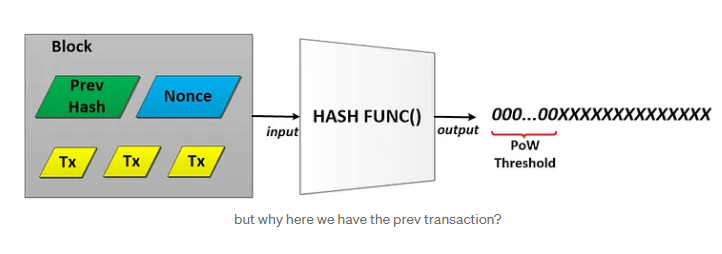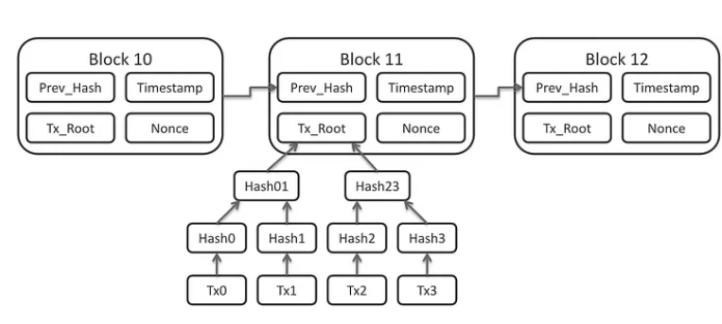Mining a block
In this tutorial we will use the most simple and basic way to mine a block.We will use proof of work.
sha256("0xs2rgi3p4jfbt43hrjweafwefwff"+0)="t09q3pfoewjaiougt80u9ropijdd"
sha256("0dnoirihp32u823u42o324rwfadsq"+1)="981r03q2ipfout8403qrp2ojiht"
sha256("8q349pjrofioh83409prjfdsfaeoi"+2)="802394qrpjiu58u93q4ropjohir"
sha256("9q0fwei0923rupi0u439rp034u9rr"+3)="fo9432ropeif43092oekr3op32r"
sha256("9r01fhewogr9u3jfeopijot0q49ru"+4)="f43epkfoij5t43pwelmfijwerk3"
sha256("t4280fhpibtqgh0w9pitq4ghgpit4"+5)="p9340ropjiot80932orit43jt09"
----------------------------------------------------------------------
//after a lot of iteration we will get to a hash that looks like this
----------------------------------------------------------------------
sha256("t4280fhpibtqgh0w9pitq4ghgpit4"+123)="000p9340ropjiot80932orit43jt09"
//we have some zeros in the front(we chose the number of zeros
//so this hash is valid

Proof of work is a computational method employed to arrive at a valid solution by repeatedly hashing data until a hash with a specific number of leading zeros is obtained. Achieving multiple leading zeros in a hash is a challenging and low-probability task.

The idea that is present in the code above can expand more, what if we link the transactions with the block? — we concatenate all the content together and apply a hash function on all of them so we will get to a specific number of zeros and that block becomes valid.
In the bottom image we see what is our end goal…so the blocks need to be linked together ( to create a blockchain ). From the bottom image we see that the blocks are linked by the prev hash. And all the transaction are put in a Merkle tree then the root node is added to blockchain.

This is the structure of a block.
//block struct
type Block struct {
//is the index of the block ex:0 ,1,2,3
Index int `json:"index"`
//time of the block when is mined
Timestamp int64 `json:"timestamp"`
//list of transaction, we will get here later
Tx [][]byte `json:"tx"`
//merkle root a byte of the merkle transaction tree
MerkleRoot []byte `json:merkle`
//hash of the prevblock
PrevHash string `json:"prevHash"`
//current hash of this block
Hash string `json:"hash"`
//nonce the number that we try to guess when we mine a block
Nonce int `json:"nonce"`
//this is the reward per block
Reward int `json:"reward"`
//this is the current coinbase of the network we grow as the network grows
Coinbase int `json:"coinbase"`
//the miner how mined the block
Miner string `json:"miner"`
}
func ProofOfWork(address string) types.Block {
getLastBlockKey := fileop.GetLastKey("db/blocks/blockchain")
if len(getLastBlockKey) == 0 {
if getLastBlockKey == nil {
//fmt.Println("Genesis:", string(getLastBlockKey))
//create genesis block
return CreateGenesisBlock(address)
}
}
newBlock := CreateBlock()
//get private and public key
_, privateKey := cryptogeneration.GetPublicPrivateKeys()
//create list of transaction
var tx []merkletree.Content
//get all transaction in levelDB
transaction := fileop.GetAllKeys("db/mempool/valide")
if len(transaction) != 0 {
//unmarshall transaction
for _, v := range transaction {
data := fileop.GetFromDB("db/mempool/valide", v)
transactionDB := types.Transaction{}
json.Unmarshal(data, &transactionDB)
transactionDB.BlockNumber = newBlock.Index
//add to list of transaction
tx = append(tx, transactionDB)
}
}
tx = append(tx, CreateTransaction(privateKey, address, nil, 100, 0, 0))
//create merkle tree
merkleTree, _ := merkle.BuildTree(tx)
listOfTransaction, RootNode := merkle.ExportLeafs(merkleTree)
newBlock.Tx = listOfTransaction
newBlock.MerkleRoot = RootNode
//reconstruct merkle tree from string
//merkleTree, _ := merkle.ReconstructTree(newBlock.Tx)
//get merkle tree from string
iterator := 0
for {
newBlock.Nonce = iterator
storeHash := CalculateHash(newBlock)
if storeHash[:2] == "00" {
//fmt.Println("Hash:", storeHash)
newBlock.Hash = storeHash
//clear db//mempool/valide
fileop.EraseAllKeys("db/mempool/valide")
//fmt.Println("proof_of_work_func:", newBlock)
return newBlock
break
}
iterator += 1
}
return types.Block{}
}
Well now we have this block mined so how we will send to other peers(because a blockchain is decentralized( not always)) ?
Up we speak about the channel that we will open to listen to data transfered in the network so… we will have a function that will send that to all the peers that we have stored in our local database.
func SendToAllPeers(node host.Host, data []byte, type_to_send int) {
//read from db all keys
number := fileop.GetNumberOfKeys("db/peers")
if number == 0 {
fmt.Println()
} else {
//get all keys from db/peers
//here we read all the data from the peers table and
//we send the block to every one of this peer
keys := fileop.GetAllKeys("db/peers")
fmt.Println("=================")
//for each key send message
for i := 0; i < len(keys); i++ {
fmt.Println(string(keys[i]))
}
fmt.Println("================")
//for each key convert to string
for i := 0; i < number; i++ {
peer_addres := string(keys[i])
//remove \n from string
//we need \n to read the characters to know where the row of data will end
peer_addres = peer_addres[:len(peer_addres)-1]
fmt.Println("Sending to peer: ", peer_addres)
if type_to_send == 0 {
//send to blocks channel
OpenConnectionMine(peer_addres, node, data)
} else if type_to_send == 1 {
//send to transaction channel
OpenConnectionTransaction(peer_addres, node, data)
}
}
}
}
Here is the the openConnectionMine function:
func OpenConnectionMine(peer_addres string, node host.Host, data []byte) {
//here we will get the address
addr, err := multiaddr.NewMultiaddr(peer_addres)
if err != nil {
println("Error: address format wrong1")
return
}
peer, err := peerstore.AddrInfoFromP2pAddr(addr)
if err != nil {
println("Error: address format wrong2")
return
}
if err := node.Connect(context.Background(), *peer); err != nil {
println("Error: connection failed")
return
}
//we send a block in this section that was mined
//we open a stream to that peer
stream, err := node.NewStream(context.Background(), peer.ID, "/mine/1.0.0")
if err != nil {
//print err
log.Fatal(err)
println("Error: stream creation failed")
return
}
fmt.Print("Sending message...")
//send string to stream
_, err = stream.Write(data)
if err != nil {
println("Error: message sending failed")
return
}
}